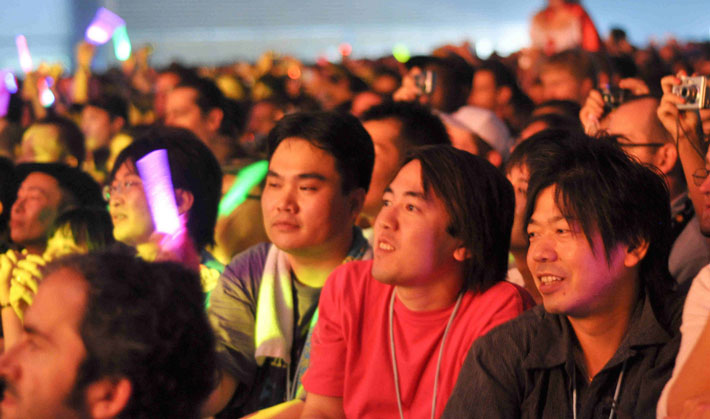If you’ve been following Tofugu the last year, we’ve run a fair amount of posts about AKB48, Japan’s hottest music group. They’re a group of dozens of young, Japanese girls who have had hits on the Japanese charts for about three years running.
We don’t write about them because we’re necessarily big fans of AKB48, but because they’re insanely popular in Japan and abroad, not to mention their antics have been hard to ignore.
AKB48’s Wacky Antics
Last year AKB48 introduced a new member to the group, only to reveal later that she was completely computer-generated. They also launched an internet service that lets you create virtual babies with members from the group.

And just recently, they raised a few eyebrows with a candy commercial that features some of the members passing candy to each other with their mouths, nearly kissing. Japan’s Broadcast Ethics & Program Improvement Organization has been flooded with complaints about the TV spot, although I’m sure just as many people are uh, enjoying it.
It’s crazy that these girls have been able to become so successful, but it shouldn’t be any surprise. Aside from the hard work that these girls have put in and the experienced producer behind them, they’re the latest in a long line of idols.
What Are Idols?
Idol (or aidoru), has become sort of a generic term for young entertainers in Japan. Idols can be singers, voice actors, or models.
But idols aren’t like most entertainers; they work their way up through a very specific career path. They’re recruited as bright-eyed, bushy-tailed kids, and are put through the paces being an idol.
Being an idol can be like an incubator for celebrity. An idol might end up becoming a big, multimedia celebrity; but, more likely than not, they won’t be famous outside of a small, localized niche.

Another thing that sets idols apart from your everyday, run-of-the-mill singer is their sophistication, or lack thereof. Idols are often recruited as unrefined, unpolished performers, and are expected to improve as time goes on.
The idol’s lack of sophistication is endearing, and avid fans can track the idol’s progress as she goes through her career.
On the surface, this whole system of becoming an idol seems pretty innocent, but if critics are to be believed, it’s anything but.
The Dark Side of Idols
Idols are held up to some pretty high standards, both by executives and fans. They can’t have any sort of Brittany Spears meltdown and expect their career to be intact.
Idols are expected to be models of innocence and purity, young and uncorrupted. Any disruption of that illusion can end an idol’s career. If an idol is caught smoking in her off-time or – God forbid – in a romantic relationship, it’s game over.
For that, and other reasons, idols have their critics; and not just on an individual level, but some people criticize the whole system of idols in Japan. (The cardigan-clad Marxy of Néojaponisme has done an especially great job of riling up idol fans over the years.)

They see idols as raw, unadulterated capitalism at its finest; part of a brutal, unforgiving system that commodifies attractive young women and exploits unsuspecting fans into making heaps of cash for producers and executives.
I can definitely see a kernel of truth in those accusations. As an outsider, it’s sometimes hard for me to really understand the appeal of these teen entertainers.
But try telling that to the fans.
All About The Fans
Idol fans are some of the most loyal, fanatic fans of anything out there. They take a much more active, evangelical role in the career of an idol than your everyday music fan.
They’ll memorize all of their favorite idol’s stats (birthday, height, weight, blood type), go to all their shows, and of course, buy all of their singles and albums. Some idol fans go so far as to buy multiple copies just to help their idol’s record sales. One crazy fan bought 5,500 copies of an AKB48 single. Talk about dedication! People in the comments are saying that the guy who bought 5,500 copies of an AKB48 single is a hoax, though not completely out of the realm of possibility.

What drives these fans? What makes them so dedicated and loyal? Obviously each fan has his or her own reasons, but my personal theory is that it’s the narrative of the idols that really draws people in.
Everybody loves an underdog story, and idols are the ultimate underdogs. They start from the bottom in a fiercely competitive, saturated market full of other idols, and try to work their way up to the top.
But the best part is that fans are part of the story. Fans track an idol’s career from the very beginning, buy the singles that help put the idol on the charts, meet with idols at concerts, and overall feel very involved in the success of their favorite idols.
Bearing the fans’ involvement in the career of idols, AKB48’s success makes a lot of sense. And you can be sure that we’ll see many, many more successful idols in the future, thanks to fan support.
(Just don’t talk to fans about Korean idols.)

